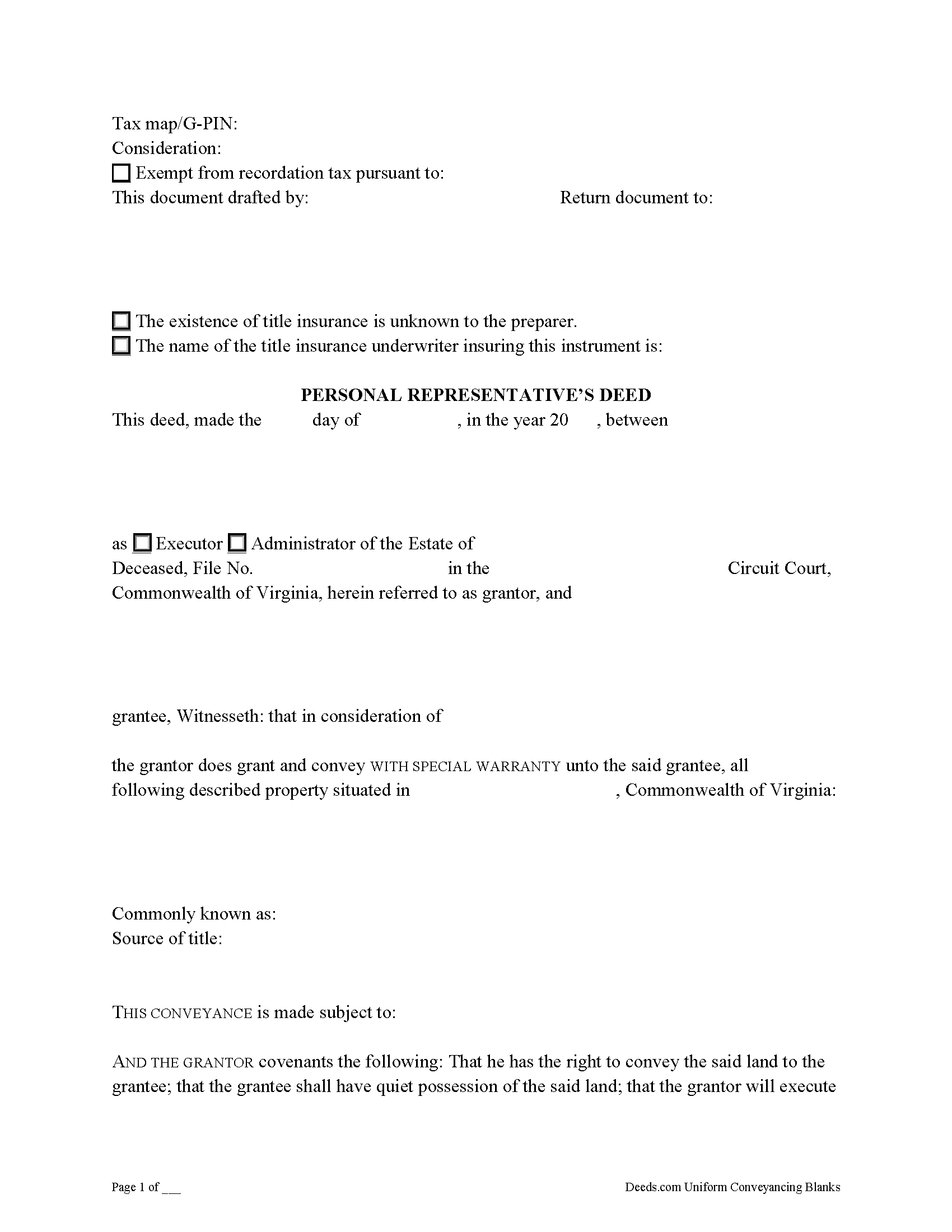Download Virginia Personal Representative Deed Legal Forms

Virginia Personal Representative Deed Overview

Probate is the legal process of settling a decedent's estate and distributing his property to devisees according to the provisions of a will or to heirs at law. A personal representative is the fiduciary confirmed by the court to administer the estate. When the decedent dies with a will, this person is called the executor. When the decedent dies without a valid will (intestate), this person is called the administrator.
A decedent's real estate passes to the beneficiaries named in his will as part of the probate process, subject to the executor's power of sale, if such power is included in the will. Intestate property passes pursuant to the course of descents established at 64.2-200, first to surviving spouse, then to decedent's children. It does not come under control of the administrator unless specified by court order.
When the decedent's will specifically directs the sale of real estate, the personal representative (either executor or administrator with the will annexed) may sell and convey the property (64.2-521). A testator (will maker) may incorporate fiduciary powers into his will, including the power to sell, transfer, and convey real property and execute and deliver conveyances of real property "in such form and with warranties and covenants as the fiduciary deems expedient and proper" (64.2-105(B)(3)). However, a power of sale is not the same as a directive to sell. To sell real estate, the personal representative must obtain an order granting the power of sale, unless the will directs otherwise.
Pursuant to a directive of the decedent's will or an order of the Circuit Court, use a personal representative's deed to transfer title to a purchaser/grantee with limited warranty of title. A personal representative's deed in the Commonwealth of Virginia is functionally equivalent to a special warranty deed. In Virginia, special warranty deeds also contain covenants of right to convey, quiet enjoyment, further assurances, and that the grantor has done no act to encumber, though these covenants are not implied (55-71 through 55-74). The grantor of a special warranty deed does not covenant that he is seized of the property, and he makes no warranty against encumbrances.
A personal representative deed identifies the fiduciary/grantor by name and capacity. It recites the decedent's name and file number assigned to the estate, as well as the court overseeing probate. The grantee's name, address, and vesting information and the derivation of title must appear on the face of the document to establish clear and marketable title. State the consideration the grantee is paying for the transfer of title. As with all document pertaining to an interest in real property, personal representative's deeds require a legal description of the subject parcel.
The fiduciary/grantor should also reference his source of authority to sell the property. To properly transfer title to the grantee/purchaser, the personal representative signs the deed in the presence of an authorized officer (Clerk, Deputy Clerk, or Notary Public) before recording in the city or county Circuit Court Clerk's office where the parcel is situated. State and local recording fees apply, unless the document notes a valid exemption. Use the Circuit Court deed calculation tool on Virginia's Court System website to determine recording fees. Verify accepted payment methods with the appropriate office.
Deeds must meet standards of form and content for recorded documents. Most county requirements coincide with the Library of Virginia's Standards for Recorded Instruments. Check with the Circuit Court Clerk's office to verify local rules and cover sheet requirements (17.1-227.1).
Consult a lawyer with questions about personal representative's deeds, or for any other issues related to decedent's real property in Virginia.
(Virginia PRD Package includes form, guidelines, and completed example)